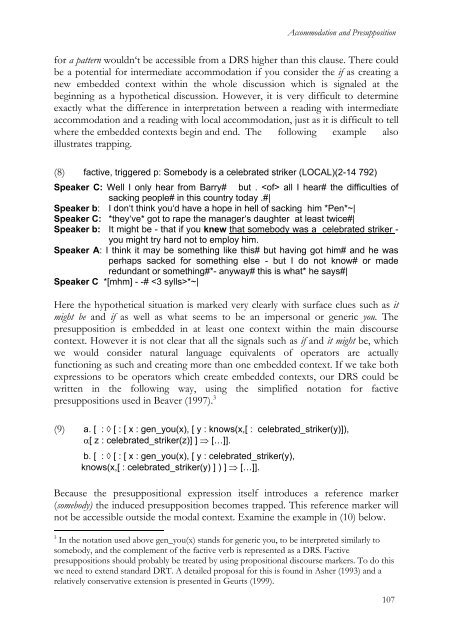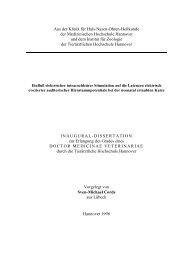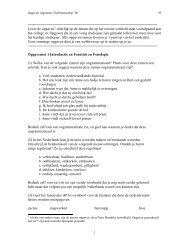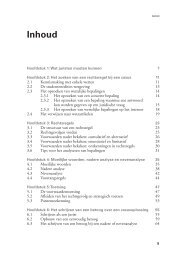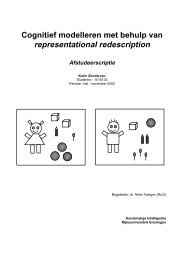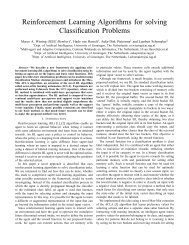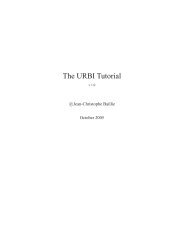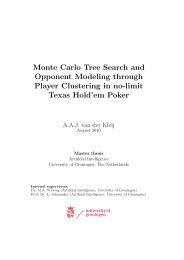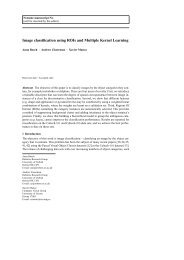Presuppositions in Spoken Discourse
Presuppositions in Spoken Discourse
Presuppositions in Spoken Discourse
Create successful ePaper yourself
Turn your PDF publications into a flip-book with our unique Google optimized e-Paper software.
Accommodation and Presupposition<br />
for a pattern wouldn‘t be accessible from a DRS higher than this clause. There could<br />
be a potential for <strong>in</strong>termediate accommodation if you consider the if as creat<strong>in</strong>g a<br />
new embedded context with<strong>in</strong> the whole discussion which is signaled at the<br />
beg<strong>in</strong>n<strong>in</strong>g as a hypothetical discussion. However, it is very difficult to determ<strong>in</strong>e<br />
exactly what the difference <strong>in</strong> <strong>in</strong>terpretation between a read<strong>in</strong>g with <strong>in</strong>termediate<br />
accommodation and a read<strong>in</strong>g with local accommodation, just as it is difficult to tell<br />
where the embedded contexts beg<strong>in</strong> and end. The follow<strong>in</strong>g example also<br />
illustrates trapp<strong>in</strong>g.<br />
(8) factive, triggered p: Somebody is a celebrated striker (LOCAL)(2-14 792)<br />
Speaker C: Well I only hear from Barry# but . all I hear# the difficulties of<br />
sack<strong>in</strong>g people# <strong>in</strong> this country today .#|<br />
Speaker b: I don‘t th<strong>in</strong>k you‘d have a hope <strong>in</strong> hell of sack<strong>in</strong>g him *Pen*~|<br />
Speaker C: *they‘ve* got to rape the manager‘s daughter at least twice#|<br />
Speaker b: It might be - that if you knew that somebody was a celebrated striker -<br />
you might try hard not to employ him.<br />
Speaker A: I th<strong>in</strong>k it may be someth<strong>in</strong>g like this# but hav<strong>in</strong>g got him# and he was<br />
perhaps sacked for someth<strong>in</strong>g else - but I do not know# or made<br />
redundant or someth<strong>in</strong>g#*- anyway# this is what* he says#|<br />
Speaker C *[mhm] - -# *~|<br />
Here the hypothetical situation is marked very clearly with surface clues such as it<br />
might be and if as well as what seems to be an impersonal or generic you. The<br />
presupposition is embedded <strong>in</strong> at least one context with<strong>in</strong> the ma<strong>in</strong> discourse<br />
context. However it is not clear that all the signals such as if and it might be, which<br />
we would consider natural language equivalents of operators are actually<br />
function<strong>in</strong>g as such and creat<strong>in</strong>g more than one embedded context. If we take both<br />
expressions to be operators which create embedded contexts, our DRS could be<br />
written <strong>in</strong> the follow<strong>in</strong>g way, us<strong>in</strong>g the simplified notation for factive<br />
presuppositions used <strong>in</strong> Beaver (1997). 3<br />
(9) a. [ : ◊ [ : [ x : gen_you(x), [ y : knows(x,[ : celebrated_striker(y)]),<br />
α[ z : celebrated_striker(z)] ] ⇒ […]].<br />
b. [ : ◊ [ : [ x : gen_you(x), [ y : celebrated_striker(y),<br />
knows(x,[ : celebrated_striker(y) ] ) ] ⇒ […]].<br />
Because the presuppositional expression itself <strong>in</strong>troduces a reference marker<br />
(somebody) the <strong>in</strong>duced presupposition becomes trapped. This reference marker will<br />
not be accessible outside the modal context. Exam<strong>in</strong>e the example <strong>in</strong> (10) below.<br />
3 In the notation used above gen_you(x) stands for generic you, to be <strong>in</strong>terpreted similarly to<br />
somebody, and the complement of the factive verb is represented as a DRS. Factive<br />
presuppositions should probably be treated by us<strong>in</strong>g propositional discourse markers. To do this<br />
we need to extend standard DRT. A detailed proposal for this is found <strong>in</strong> Asher (1993) and a<br />
relatively conservative extension is presented <strong>in</strong> Geurts (1999).<br />
107


